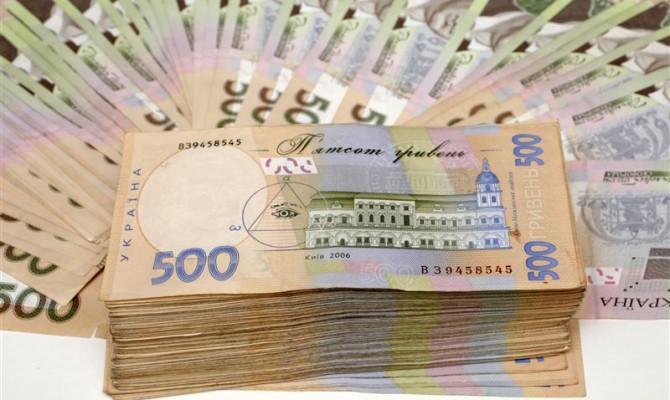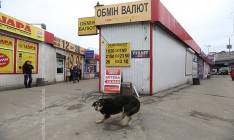Economy
national debtDevaluation of the hryvnia is preventing the Ministry of Finance from attracting resources to the national budget

This past Tuesday the Ministry of Finance failed to place government bonds. The ministry tried to sell hryvnia government bonds maturing in two, five and seven years and 2-year foreign currency government bonds. Placement of the first did not take place, as no bids were received for such bonds. For the second category of bonds the Finance Ministry received only one bid with a return of 14% and did not approve it. This is the fourth unsuccessful auction for the placement of government bonds of the 11 auctions conducted by the Ministry of Finance since the beginning of August. In the course of another three auctions that were partially successful, only one bid in each was approved.
Since the beginning of the month the ministry attracted UAH 4.7 bn of domestic debt in hryvnia and not a dime of foreign currency debt. At the same time, more than a half of hryvnia government liabilities – to the value of UAH 2.1 billion at 19% per annum – was acquired on August 15 through Deutsche Bank by a single foreign investor. By the end of the month the Finance Ministry plans to hold another auction of government bonds on August 28.
No demand
Weak demand for local Ukrainian sovereign debt is not associated with the lack of funds among potential buyers. On the contrary, today the balance of funds in correspondent and transit accounts of banks is significantly higher than average level. As reported by the NBU, at the beginning of the day of the auction there was UAH 33 bn on accounts. For comparison, last year the average was UAH 25.3 bn, while the standard amount is approximately UAH 20 bn.
Exchange risks deter investors from government bonds, both in hryvnia and in foreign currency. Thus, according to Director of the Investment Business Center at UkrSibbank BNP Paribas Group Serhiy Yahnych, zero demand for government bonds is explained by the fact that investors have decided to refrain from investing in the rapidly devaluating national currency.
As a reminder, on the day of the auction, hryvnia exchange rate reached a new historical peak in the interbank market having dropped by 50 kopecks a day, reaching the level of UAH 13.95 – 14.30 per US dollar at closing. Therefore, since the beginning of the summer hryvnya for buying has lost 18% of its value, hryvnia for sale – 20% of its value and since the beginning of the year – 68% and 72%, respectively.
Financial Analyst at the Expert Rating agency Vitaliy Shapran says such situation spins inflation. “At devaluation of 50 – 70% the inflation rate cannot remain at 20%,” he said. According to the State Statistics Service, in January – July the prices have already grown by 6.8% on average compared to the same period in 2013, or by 12.6% in annual terms. And in July, even before the August wave of devaluation, the Chair of the National Bank of Ukraine Valeria Hontareva predicted that by the end of the year inflation could reach 17 – 19%.
Too little
Meanwhile, based on the last placements, the Finance Ministry proposes yield at the rate of 17.3 – 18.98% for two-year bonds, 16.5% for three-year bonds and 14.3% for five-year government bonds in national currency. “With the current devaluation and inflation there is no sense in investing in government bonds with a yield of approximately 20% on the secondary market, let alone the primary market,” says Shapran. So for now, says Head of Department of Debt Instruments in the Local Market at Concorde Capital Yuriy Tovstenko, banks either place their hryvnia resources on the interbank market or invest in foreign currency or simply take a wait-and-see position. In addition, banks do not need government bonds as a backup tool, because they are reducing the amounts of lending and disbanding the reserves, explains Shapran.
Therefore, investing in government bonds makes sense for investors only with a view to strengthening of hryvnia. Otherwise, the ministry will be able to incite interest of investors in these securities only by promising them higher returns than in the past. In fact, thanks to an increase of the bonds’ yield from 15% annual during the primary placement in April to 18.98% in the course of the additional emission on August 15 the ministry managed to attract a non-resident to buy three-year government bonds in the amount of UAH 2.1 bn. “In order to attract investors to buy government bonds, their rate of return should be higher than 20%. In addition, volatility of the exchange rate should decrease,” believes Tovstenko.






 of the agreement of syndication with Financial Times Limited are strictly prohibited. Use of materials which refers to France-Presse, Reuters, Interfax-Ukraine, Ukrainian News, UNIAN agencies is strictly prohibited. Materials marked
of the agreement of syndication with Financial Times Limited are strictly prohibited. Use of materials which refers to France-Presse, Reuters, Interfax-Ukraine, Ukrainian News, UNIAN agencies is strictly prohibited. Materials marked  are published as advertisements.
are published as advertisements.